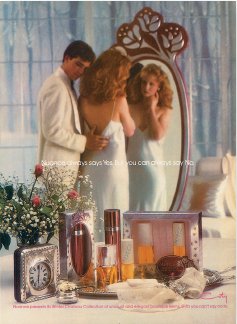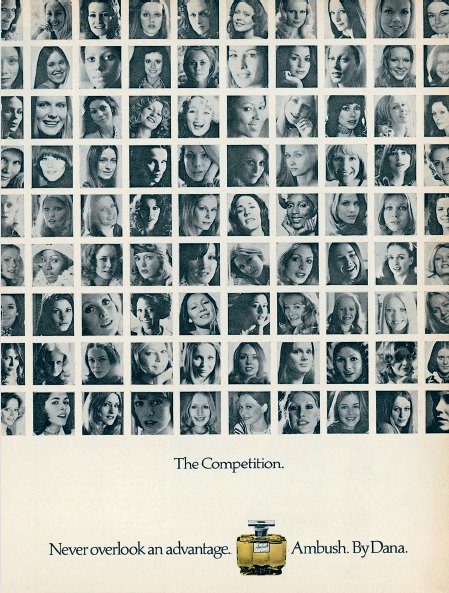Scent and Subversion (22 page)
Read Scent and Subversion Online
Authors: Barbara Herman

by Halston (1975)
At once masculine and feminine, friendly and formal, and chic and sexy, Halston perfume for women embodies the mixed-crowd ethos of the Studio 54 denizens who wore it. Steve Rubell, co-owner of the legendary late-1970s, early-1980s discothèque, was famous for letting beautiful unknowns past the velvet ropes to hobnob with the celebrities who had debaucherous fun there: Jack, Angelica, Andy, Bianca, Liz, Liza, Calvin, Brooke (Astor and Shields), et al.
Like the nightclub its namesake helped make famous, Halston perfume is less interested in who comes to its party than that everyone, because they look like they’re having fun, looks beautiful.
Green, fruity, floral, fresh, spiced, mossy, and woody (talk about a mixed crowd!), Halston for women typifies late-1970s fashion when simplicity—thanks, in part, to Roy Halston—was chic. Its somewhat austere green/mossy/chypre soul has done a bump of coke and decided to put on some lip gloss and a slinky Halston column dress and dance the night away.
The chypre category, like the ideal 1970s woman, is on the verge of androgyny. Flanked by bitter, herbaceous green and mint on one side and woods and oakmoss on the other, the “feminine” fruit-floral peach-rose-jasmine heart of Halston is like a woman’s body in one of those fabuous “Le Smoking” suits YSL made famous for women in the 1970s. Hours into Halston’s drydown, I smell an artifact of the past: a whiff of the powdery Doublemint gum wrapper, sweetly scenting Halston with its mint and refreshing its base of resins, moss, woods, and warm amber.
Even the famous Halston bottle has a chic lineage. Designed by Elsa Peretti, model turned interior designer turned jewelry designer for Tiffany’s in the 1970s, the biomorphic bottle is modern in its stark simplicity and soft with its curves, like her famous teardrop-heart necklace and thumbprint ring.
There was a time when Halston was the second-top-selling perfume in history, next to “le monstre” Chanel No. 5. Sniff out some vintage Halston, and you’ll know why.
Top notes:
Tagetes (marigold), green notes, spearmint, peach, bergamot
Heart notes:
Jasmine, cedarwood, rose, carnation, orris, ylang-ylang
Base notes:
Moss, patchouli, vetiver, sandalwood, olibanum (frankincense), musk, amber
by Bruno Acampora (1975)
Bruno Acampora appears to have been quite the bon vivant in the 1960s and 1970s, traveling from Capri to Marrakech to New York City, stopping long enough to have Andy Warhol do a portrait. So maybe the raves I’ve heard about his Musc Oil come from the accumulated lore that surrounds the man, because this strange little musk just confused me. There are moments when Bruno’s musk smells a bit like men’s cheap cologne (and cheap it is not: $185 for 10 ml), but its complexity keeps me interested.
CB I Hate Perfume’s Musk Reinvention seemed to take out most of what’s in Bruno Acampora’s musk, leaving only the dirty-skin smell, which means taking out a lot: notes that are green, herbaceous, camphory, Band-Aidy, mushroomy, humid, sharp, earthy, and woody. This is not a shy musk, or a skin musk, or a subtle musk. It is very long-lasting, spicy, and strange. It’s still growing on me (and I might mean that literally!), given the mushroom note that seems to hover over it.
Notes:
Musk, rose, violet, cloves, amber, sandalwood, patchouli
by Coty (1975)
For a perfume whose tagline was, “If you want someone’s attention, just whisper,” Nuance sure is loud. A woody-powdery, aldehydic floral chypre, Nuance starts off with rich fruit notes of peach and plum. Those notes join with a spicy violet and herbaceous heart with a classic chypre base. These days, Nuance has all the hallmarks of “perfumey” perfume that would prompt many to say, “That smells like my grandma.” It hits all the right notes, but without being particularly distinguished.
Notes:
Aldehydes, lemon, plum, peach, rose, orange blossom, violet, cinnamon, lavender, herbs, trees, moss, vanilla, musk

This 1978 Nuance ad suggests that “Nuance says yes.”
by Guerlain (1975)
The citrus and galbanum in Parure (“Jewelry Set”) is bracing and bitter. Herbal notes of thyme and clary sage soften this brightness and prepare you for the sweet warmth of a jasmine that shines like the sun within Parure’s dry, mossy, leather impression.
Soon enough, the “formal” part of the perfume announces itself: leather, moss, styrax, and vetiver, with amber and Tolu balsam’s warmth echoing the jasmine. For a moment, there’s an interesting caramel note that recalls Azurée and Miss Balmain, an evanescent gourmand quality in an otherwise fresh and moss-dry fragrance. Parure’s balance of citrus, warmth, and mossy-dry-leather is perfection.
Top notes:
Aldehydes, citrus oils, thyme, galbanum, clary sage
Heart notes:
Jasmine, rose, lilac, lily of the valley, orris, narcissus, jonquil
Base notes:
Leather, styrax, vetiver, moss, Peru balsam, amber
by Bonne Bell (1975)
“If warmth had a smell, it would be SKIN.”
—
1979 AD FOR SKIN MUSK BY BONNE BELL
We learn in Chandler Burr’s
The Perfect Scent
that Skin Musk was a favorite of Sarah Jessica Parker, which is interesting both because it’s a cheapie drugstore scent and because it smells like a masculine scent—albeit a modern, niche masculine scent! It starts off with some kind of bright note, probably bergamot or lavender, but its development is what makes it interesting. It has the rich sensuality of many simple 1970s musks, which were like one modulated low growl in a bottle. And although it has some overly synthetic-smelling moments, Skin reminds me a bit of L’Artisan’s Dzing in its “What the hell am I smelling exactly?” effect.
As its name suggests, you have to get really close to it on skin to smell it. Skin starts off with an indistinguishable floral note (rose?) embedded in a complex mix of wet cardboard, that flinty, sulfurous scent after a match is lit, sandalwood, and, of course, musk. As it dries down, a wonderful nutty, nonsweet vanilla warms the skin and stays as a sheer veil of spicy warmth.
The idea that Skin (or Skin Musk) was marketed to teen girls in the ’70s just goes to prove that perfume styles are culturally determined, changing with the mores, lifestyles, and politics (gender and otherwise) of the times. What are teen girls wearing now? Princess by Vera Wang? The latest schlock from Kim Kardashian?
I had it on last night and, after a couple hours, asked some friends to smell my wrists. The words they used to describe it were “fresh” and “transparent.” Not bad for a little dime-store beauty!
Notes not available
.
by Capucci (1975)
Can perfume smell fluorescent? After my first hit of Yendi, an odd and intriguing floral by Capucci, I can say that the answer is yes. Yendi opens on a high note that combines fizzy citrus that reads like lime, soft-powdery sweet hyacinth, clear rose, and bright florals, including an intense lily of the valley. I also detect a leafy-green facet reminiscent of coriander.
Yendi warms up fast, thanks to a fleeting clove-bud note that bridges the perfume’s crisp top and heart to its woody-musky-incensey and powdery drydown.
The styrax and musk base gives Yendi a fresh, clean-but-slightly-dirty aspect. After about an hour, Yendi left a faint amber/vanilla impression with a whiff of powdery orris.
This juxtaposition of fizzy citrus and clear florals with a subtle musky drydown makes Yendi bright but complex. Unlike the “clean” fragrances that came to dominate the 1990s, Yendi—and many other 1970s florals, chypres, and green scents—maintains an allegiance to the body by retaining traces of its musky sweat in the notes. These scents aren’t trying to mask the body, just embrace it.
Top notes:
Aldehydes, bergamot, hyacinth, peach, raspberry
Heart notes:
Rose, honey, lily of the valley, cyclamen, clove bud, orris, orchid
Base notes:
Sandalwood, musk, cedarwood, amber, styrax, vanilla, moss
by Fabergé (1976)
With its cheesy name and designation as a floral in my
Haarmann & Reimer Fragrance Guide,
Babe could easily be passed over by the perfumista hunting for an interesting vintage perfume. That would be a shame, because like many 1970s scents, Babe is complex and interesting without being overbearing. Babe is really a floral chypre whose sheer light florals (kissed by a hint of ripe raspberry) are balanced with a touch of spice and sweet warmth from carnation and amber, earthiness from vetiver and treemoss, and a rich golden woodiness from sandalwood.
Top notes:
Aldehydes, raspberry, hyacinth, bergamot (aldehydic fresh)
Heart notes:
Lily of the valley, honey, rose, orris, carnation, jasmine (romantic floral)
Base notes:
Vetiver, musk, sandalwood, amber, treemoss (sensual powdery)
by Anne Klein (1976)
With a name that couldn’t be more dated unless it was called Gauchos or Shoulder Pads, Blazer is nevertheless a gorgeous fresh floral whose chypre base ensures that it smells unlike anything out these days. A fresh, lemony-citrus top is warmed and sweetened by a plum note, while a rich, buttery sandalwood joins with musk and moss to put a more-formal jacket—er, blazer—over the casual Friday that is this perfume’s top and heart notes.
Top notes:
Bergamot, lemon, mirabelle (plum), hyacinth
Heart notes:
Oeillet (carnation), orris, lily, jasmine, rose
Base notes:
Mysore sandalwood, cedar, musk, moss

The Competition: Sisterly love takes a hit with this 1977 retrograde ad for Ambush.
by Pierre Cardin (1976)
Poised between a big ’80s scent and a strong ’70s chypre, Cardin straddles these two eras in its top and heart notes. Green, sweet, and fruity in its aggressive opening, Cardin moves into a rich floral that’s topped by sweetness, tempered by green notes and lifted by aldehydes.
Top notes:
Green note, raspberry, bergamot, aldehyde
Heart notes:
Jasmine, rose, carnation, ylang-ylang, orris, honey, lily
Base notes:
Sandalwood, musk, oakmoss, amber, civet
by Van Cleef & Arpels
(1976)
Perfumer:
Jean-Claude Ellena
Some perfumes are lyrical poems that capture the fleeting emotion of particular moments or times. And some perfumes are epic dramas, dressed up with multigenerational characters, crisscrossing plots and subplots, and a Moral to the Story. First is in the latter category.
A big, elegant floral in the vein of an Arpège (1920s) or L’Air du Temps (1940s), First seems almost out of its time in the 1970s. First is Jean-Claude Ellena’s uptown creation before he went downtown and became minimalist, and as befits a perfume for the haute Parisian jeweler, Van Cleef & Arpels, First just smells expensive. It’s the perfume equivalent of those floral arrangements one sees in the lobbies of expensive hotels.
From the first note of sweet fruit to the burst of fresh florals, followed by their deepening into woods and animal notes, there is drama and development, all in the service of making the florals sing a gilded tune.
Top notes:
Aldehyde complex, peach, raspberry, hyacinth
Heart notes:
Jasmine, Rose de Mai, lily of the valley, orris, tuberose, orchid, carnation
Base notes:
Vetiver, musk, amber, oakmoss, honey, civet, sandalwood
